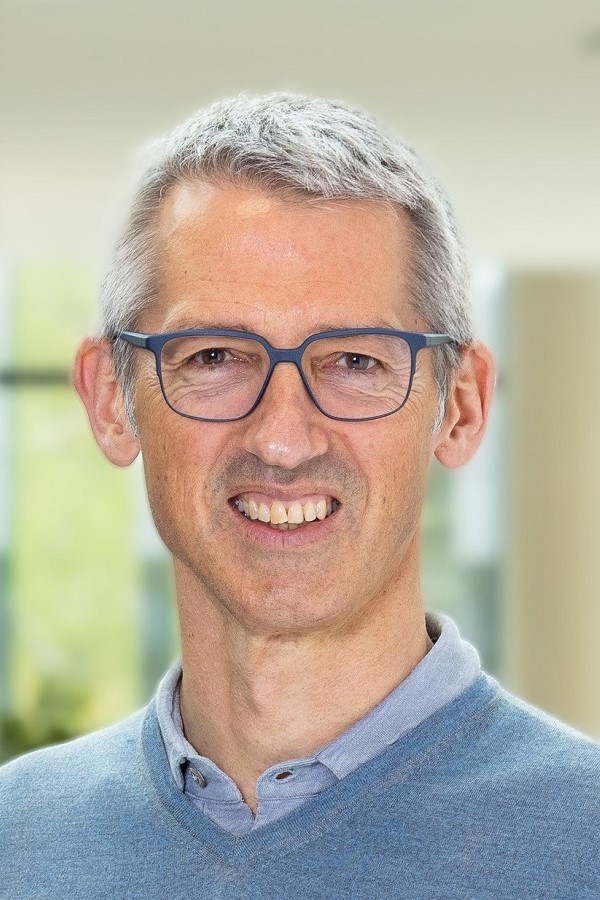Jan Ellenberg is head of the "Cell Biology and Biophysics" department at the European Molecular Biology Laboratory in Heidelberg. His research focusses on the molecular and physical principles of cell division and cellular nuclear organisation.

Dr. Jan Ellenberg
Stuart Ingham, EMBL
Jan Ellenberg studied biology and biochemistry in Hamburg and Berlin and did research in the US at the National Institute of Health (NIH) in Bethesda until 1999. Since 1999 he heads his own the group at the European Molecular Biology Laboratory (EMBL) in Heidelberg. Furthermore Ellenberg coordinates the research division for Cell Biology and Biophysics and he is the head of the EMBL Imaging Centre. As a molecular biologist, he primarily researches the cycle of cell division and the organisation of the cell nucleus. With his team, he has been able to provide numerous new insights into the underlying molecular processes in the cell. In the long term, Ellenberg's team would like to develop methods for the systematic investigation of the error-prone first mitotic cell divisions in mammalian embryos.
In 2004, Ellenberg was awarded the Walther Flemming Medal and received honorary doctorates from the Abo Akademi in Finland and Stockholm University in Sweden. He is an elected member of several scientific organisations, such as the German Academy of Sciences Leopoldina, the Academia Europaea and the European Molecular Biology Organization (EMBO).
Further information: EMBL/Jan Ellenberg
The use of embryos in research – challenges and obstacles for Germany in European context
Research on early human development has large potential to gain new fundamental knowledge and lead to a better understanding of disease. New analytical and imaging technologies for the first time allow a molecular understanding of how the beginning of human life works and reveal why infertility and congenital diseases occur, how we can recognize them early, diagnose and eventually treat them in a better, safe and effective manner. Understanding how human life starts is furthermore important to inform good ethical and legal frameworks so the new knowledge can be used responsibly for the benefit of our citizens.
The research in our laboratory focuses on the earliest steps of mouse and bovine embryo development in vitro and provides an instructive example. By using a newly developed microscope we studied how mammalian embryos divide. Surprisingly, we found that the parental genomes remain separated from each other in the first embryonic division. This discovery explained a common problem in IVF treatments and could allow to diagnose embryos at high risk to abort development better in the future. As the German embryo protection act defines the human embryo by the “time of cell nuclei merging”, the knowledge that this process works very differently should also inform an update of the law.
In Germany, research on mammalian embryos is restricted to laboratory models such as mice or agricultural animals such as pig and cattle, while research with surplus human embryos from IVF treatments is outlawed. Although Germany develops some of the best technologies and has leading cell and developmental biologists, they cannot study early human development and cannot contribute to improve the quality of patient care that seek fertility treatment. Scientists in Germany cannot even collaborate with their colleagues in European countries or internationally where such research is legally possible after thorough ethical scrutiny and approval by public authorities.
Our work led us to experience these restrictions very directly. Publication of the new microscope for embryos and our discovery with it led to attention in the scientific and popular press and triggered numerous requests from European research institutions to collaborate with us for their, nationally legal, research on human embryos. Due to the legal situation in Germany, we had to decline these requests and could also not provide technical support for such studies abroad. This situation isolates life scientists in Germany from the rapidly accelerating research in the field in Europe as well as in the US and makes it difficult for them to contribute to the international ethical debate around embryo research. We therefore support the recommendation by the Leopoldina to allow research with surplus human embryos for objectives of outstanding interest in Germany in accordance with international standards and and create a new legal framework to regulate it.